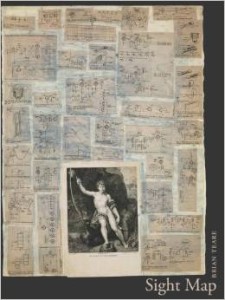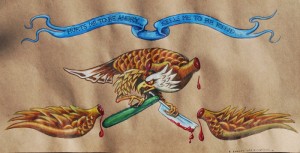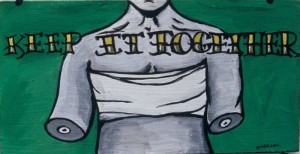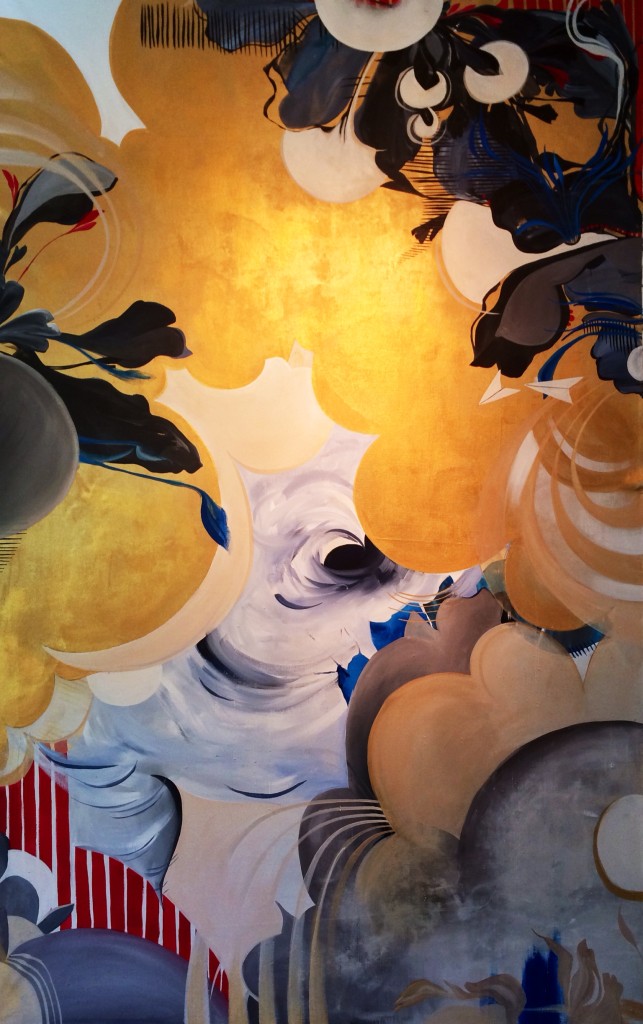From CutBank 81

PROPHECY
There is no telling what I am, what I’ll do, so I lift the lighter to my hair. The thumb-sized flame crackles as it meets the hard ridge of my Aqua-Netted, Morrissey-inspired pompadour. My audience laughs, four boys like me who have endured the first week of college orientation, their faces smiling each beneath baseball caps. The odor of singed hair fills the room. I would burn my head bald for them. But I would singe every hair on my body to kiss Jamie, a constantly-grinning boy whose worldly ease I want to possess. He lays on his stomach on the bottom bunk of his bed, his pale face propped up by his hands, enthralled as my hair dissolves into smoke. He’s the one who has kidded me into doing this, into making my hair an effigy. “Dude,” he said, grinning at me the way boys do when they want to dare you, “your hair is so gay.”
Tony, a skinny twin who can’t dance and is thus always dancing, sprays the Aqua-Net into the lighter’s flame. My head ignites, an orange periphery surrounds me, and the laughter is harder to hear, beyond the quick ball of fire. Jamie rushes a recently-used shower-towel over my head, and I am dampened, smoldering, laughing, even though I know my hair, my pride, is a disaster. I laugh even though I feel the fire scorching down into the soft part of me, where I hate myself. Self-immolating fool, clown who tries to make boys love him—boys who would, without doubt, feel betrayed if they knew who I really am.
That night, I dream his face closer to mine, our heads making a tent underneath the wet blue cloth. He says, “I want to fire you.”
That year, at frat parties where guys unzip and wave their dicks around, at the urinals in the Student Union bathroom, in the showers where my dorm-mates pass out drunk in their underwear while the water streams down and over their innocent bodies, at times in the common rooms where jocks lounge in shorts that ride up when a leg is thrown casually over the arm of a lucky chair, I avert my eyes. I live in a double-occupancy room in Gordis Hall, on a Baptist campus, in the small town in which I grew up but left. I live a returned townie life. I live it in fear. If I don’t keep the flame of me buried, it will engulf me, send a signal into the dark sky of common brotherhood, dissolve me into so much putrid smoke.
What I am should be extinguished.
***
We know the morality of characters in our fairy tales by their hair. “Golden sunshine in her hair,” Merryweather opines, blessing the infant Princess Aurora before she is cursed to sleep. The same words fall from Malificient’s mouth, but are twisted into curse, as if she is pleased that all that sunshine will go to waste, as if by rendering the maiden unconscious the land itself is cured of sun and moral righteousness. All over peroxide and conditioner.
Think of the Little Mermaid, the sacrifices that were made for her form. Her devoted sisters, having heard through the underwater grapevine that Ariel forever forfeited her fins because her beloved wed another, offer their own hair to the Sea Witch. In exchange, the hag gives them a knife which Ariel must use to kill the Prince in order to regain her mermaid form. Of course, her heart breaks at the sight of her shorn sisters, their bald heads bobbing like jellyfish in the open blue water. But she cannot bring herself to kill; her sisters’ hair has taught her nothing if not self-sacrifice. Think of Rapunzel, letting that stud traipse up her trellis of locks. Think of the hero, lost in the glorious folds of her hair, exalting in the thick ropes of what he must tactilely come to think of as Rapunzel’s most private, lush self. So that when the witch, with her overprocessed permanent and wretched split ends, divests Rapunzel of her hair, the hero has no clue he is climbing into the clutches of evil.
Hair bewitches men. It is the currency of desire. Hair is the prophecy I listen to.
***
Once, I dyed my hair red, let the front of my hair grow out long, until the thick strand reached the nape of my neck. Unfurled, it was a little flame in the wind. I wanted hair I could let down.
Once, I car-flirted my way down to Key West with a man who sped up and smiled. The hair flew over my face, out the window, toward him. My hair, a bridge that beckoned, a line not strong enough to cross.
Once, I watched two South-American men play tennis on the courts outside a friend’s apartment. They played badly while I smoked. My lips left my Marlboros red-kissed. One of them hit the ball over the fence, and it bounced onto the concrete and landed on the second-floor level, where I caught it. The players stopped still. I held the ball out in my hand, Eve proffering an apple. The retriever soon came loping up the steps, the more athletic one with short hair and a liquid smile. I made one up when he asked my name. I asked if he wanted a drink, and he waited there on the terrace. He drank the water while looking into my eyes. The sweat made his skin shine through his shirt. I wanted more when the cup was empty.
Once there was no artifice, only a real body, a hand touching it, saying, You are my beloved, and that is how I know I am real. But that was just a fairy tale: no body is real.
I tried giving up desire. The prayer would start, Please let me wake up different.
Once, I was a man below, a woman on top, a palimpsest that made me less clear to the world and made the world clearer to me.
Once I was not a satyr, a eunuch. Once I was not trans- or bi- or uni-. I could not be prefixed.
Once I was afraid my roots were showing.
Then, I was afraid no one would see them.
***
Hours spent standing behind my mother, her hair unwashed and knotted, a cigarette smoldering down to its filter in the ashtray beside her chair. Hours taking the brush through the matted blond mess, my mother saying, “Brush it harder,” telling me how when she was a child her brother used to drag her through the yard, caveman-style, by her hair. Me raking the comb along her scalp. I grew up in front of the T.V. Behind my mother’s head, I watched Merv Griffin, Sally Jesse, reruns of Green Acres. I loved how the comb organized the hair, then reorganized it, again and again. My middle-parted, side-parted, zigzag-parted mother; feathered mother; faux-beehived mother; diagonal mother; mother waiting to be French-braided, pigtailed, side-ponied, a woman waiting to be made, unmade by my hands.
***
While manning the counter with two other African American women, my boyfriend overhears an older white woman say to his co-worker Yoli, “Why do you and that other woman have such different hair?”
Yoli is East African and wears her hair natural, while Charlotte, the coworker to whom Culturally Insensitive Crusty White Lady gestures, has her hair locked into long dreads. They are all working in a discount bookstore in Rice Village, in Houston, a semi-posh 16-block outdoor shopping center. For Brandon and Charlotte, time slows. They can sense that this old lady in her Anne Taylor powder-blue suit has morphed for Yoli into The Very Last Straw.
“Maybe because we’re two fucking different people,” Yoli snaps.
The manager, a white man who cheats on his black wife, reprimands her, says, “For Chrissakes, Yoli, it’s only hair!” He demands she apologize. She does. Then he fires her.
***
When I was a kid, my grandmother’s chief responsibility in life was to visit her sick elderly friends and gift them the potted, unflowering plants which she grew in her greenhouse. She is visiting one such a friend, a half-hearing woman whose muumuu looks plastic. Dustin and I pass the time in her large dark house by playing hide-and-seek, crawling behind the couches, hiding on the enclosed porch. When it was time to go, grandma’s friend remarked how nice it was to meet “Janie and Dotty.” Afterward, in the heavy car-ride silence, I could see in my grandmother’s tight-drawn mouth a plan forming.
My first haircut, then, took place in a barber shop, complete with Marvy barber pole and townsmen reading the paper, my grandmother standing by, her pocket-book cradled in the crook of her arm. The barber was rough. He’d grab a length of hair, pull it taut between two callused fingers, snip. His belly pressed against the back of my head while he cut the front of me, transforming me. “These boys look…different,” he said to my grandmother, who sent him an imploring look: yes, change them.
“…different” meant I looked like a little girl. A few weeks earlier at the park where my older brother played soccer, a man asked to photograph me on the monkey bars. I was flattered. He told me to “Ask your mommy first,” which I did. My mother met the man, and then retreated back to my brother’s soccer game. I posed on the bars, on the ground, smiling at and for the man, his quickening shutter finger. At the end of our session, he reached a trembling hand out. He stroked my hair and said, “You are such a pretty little girl.” Inside, my heart broke and quivered: I was pretty was true if I was a girl was true. He resheathed the camera, faded out to black.
My scalp throbbed under the barber’s hands, his long, flat black comb, which he pulled out of his cutter’s belt, where he kept scissors and razors and other instruments of torture. My hair was cut across my forehead, lifted above my ears, nearly flat in the back and on the sides. After he was done, my grandmother stooped to the ground, collecting a handful of hair that she then deposited in one of those opaque plastic envelopes she’d brought for the occasion. She paid the man, but did not tip him. She took me and my brother, my clean-cut twin, for ice-cream. I ordered a banana split because I’d never had one before. The white fruit cleaved by three scoops of chocolate. It was disgusting. I relished the maraschino on top but let the black-and-white dessert turn to soup. Sitting on a picnic bench along the town’s main drag, my grandmother beamed at the passersby. She ate her sugar cone expertly, saying more than once, “I’m so glad to be out on a date with my handsome young men.” We were her courtiers, minted heterosexuals, out for granny delights.
“What the fuck did you do to my kids,” my mother said, upon sight of us.
“Now, Marsha. Just gave them haircuts. It’s what grandmothers do.” She sniffled. “They needed it.”
They needed it was my grandmother’s motto, what she said after we unwrapped socks on Christmas, or after she’d refolded all the towels in my mother’s bathroom closet on the nights she babysat us. They needed it was also what my mother called “fightin’ words.”
My mother hugged us to her body, hands crisscrossed in front of my brother and me. We were little human shields in the yelling that passed over the trenches of our bodies. It ended when my grandmother slammed out, and my father opened the door and said to her retreating form, “This is how you slam a door.” It rattled the windows.
Later, Dustin and I would come home from grandma’s house with our nails painted and our cheeks rouged, our lips reddened by the thick-tasting lipstick my grandmother used. Dustin couldn’t stand to use the eyeliner or mascara. He preferred rooting in my grandmother’s closet for the finer of her costume dressinggowns while I sat at her powder-blotched vanity, pulling my eye open with a finger and running the pencil along the lid until it tickled and itched, perfected. My eyes darkened and sultry, a silverscreen film star’s smoky almonds. Finally, the eyes of a woman who looked into a camera and did not shy from its glassy stare.
***
When I told my Grandmother I wanted blue hair, she said, “Don’t ask your grandmother to go with you anywhere.” She was an oracle decrying the would-be embarrassed woman, guilty by bluehair association. At nine years old, I was her shame, threatened with excision.
My grandmother permed her hair every two weeks. At the beauty school. Where she paid ten dollars. And asked the woman to please clean her ears out. She was devoid of shame. And she let me waste reams of paper at her typewriter on rainy afternoons. I’d sit at the card table and hammer the keys just to hear the language strike home. Nothing was more satisfying than the zing and swoosh of the carriage return. Or replacing the miracle of corrective tape. Only at her typewriter did I want to be a mechanic, to understand machine parts moving in concert.
And she gave me Harlequin Romance novels to read for inspiration. Genuine bodice-rippers, with covers depicting cottonbosomed women swept into some Fabio’s embrace. Once, after loving one of those novels so much, I typed a fan letter to the author. My grandmother wrote the cover letter, explaining my young age, saying how I’d spend hours at her typewriter. “Budding writer,” she called me, and if she had said them aloud, I think her voice would have had an air of pride about it. I wanted hair that would be shocking, off-putting in a comely, bold way. I wanted words that way too.
***
My mother’s father had a full head of hair when he died in 1995, the summer after my freshman year of college. He was 70, living alone in one of those comfortable houses on a treeshaded street in Orange City, a few towns over from where I went to school. He called where he lived “Sun City,” erasing the gap between the two words. My mother hadn’t talked to her father in years before he went into the Volusia County Hospital. But I had.
My roommate, Sean, and I used to prank call my mother’s father. It started innocent enough, with Sean phoning as a lost pizza-delivery man. My grandfather, always polite to strangers, thought he was delivering to a neighbor: “If you pass Mano’s, well now you’ve gone too far,” my grandfather advised. When Sean repeated the address, Pa sputtered out, “But well that’s my house!” Sean concluded, “Old man, you are paying for this pizza.”
If Pa was proud of one thing, it was his virility. After all, as a senior citizen, he’d had two 17-year old girlfriends, and had been arrested for soliciting sex from an undercover police officer in a park. (A male officer, at that). My grandfather was nothing if not a man of vim and vigor. And so Sean’s off-the-cuff taunt got Pa steaming mad. He informed Sean that he wasn’t, “Payin’ for no pizza from a little pussy.” Sean got real quiet, his face gained its Irish blush. “You’re paying for this pizza, asshole, or I’m going to kill you.” I muffled my guffaws with a pillow.
Pa didn’t see the humor. He screamed into the phone, “Bring it on! Bring it on, pizza man!” We could hear someone—a woman—in the background saying, “Clayton, honey, who IS it?” It was either Mentora, the woman he was seeing before my grandmother’s funeral, or Anne, who my aunts told me, worshipped Satan. Which means she was probably Presbyterian.
After that first prank call, my grandfather opened his front door to a dazzling array of pizza boxes strewn over his lawn. My dorm-mates called him weekly, hollering into the receiver, “Bring it ON!”
Two things surprised me. One, that he never called the cops. But, I guess a natural distrust develops between felons and “the fuzz.”
The other thing that surprised me: my grandfather kept his hair throughout this ordeal. “He looks like Hitler,” my cousin Shanda said, looking down into the coffin at his funeral. His head was propped up on a pillow, as if he were just about to lurch out of that box. He did look like Hitler—he had a thin mustache growing at the time of his death, and his hair was cut short and swept from the left side to the right. His forehead was pale and shiny, his hair dark and oily. But I don’t know if Shanda would have said that about Pa if the stories about him hadn’t been handed down, circulated now among the grandkids.
Shanda kept cracking jokes. My cousin Travis kept laughing, looking less awkward in a borrowed suit now that he was throwing out jokes. I smirked my allegiance to my cousins and their irreverence but somehow my eyes kept wandering over to the dirty old man in the box. I kept thinking, I will inherit that receding hairline, I will inherit that head, the way the eyes recede, sink back into the skull. With one ear locked on the jokers’ world, I wanted to lock the other to the dead man, I wanted to hear him answer: what other parts of me will be like you?
***
I never saw my father cut his hair in my life. He never went to a barber, a salon. He cut it himself, with an electric razor. His hair is fine, black, and wavy. In pictures of a younger self, my dad is clean-cut, shaved beneath controlled locks of hair, which he parts on the side. Though I have my mother’s straight hair, it’s my father’s hairstyle I emulate. Parted on the side, brushed straight over, though now I flip mine up in the front, much to my boyfriend’s chagrin. I like this hairstyle, its forthrightness.
In a picture of my dad reading the newspaper, I am reading over his shoulder, hunched down next to him, nearly cheek-to-cheek. It’s a posed photograph, though I can’t remember what for. My dad is wearing a green shirt, and I’m dressed for school in a red Roman-collared shirt, my hands tucked into my jeans. But what is striking about the photograph is not the age of the people in it, nor the fact that I am seemingly interested in the Sports Page. From the downward angle of the lens, my dad and I look like hair-twins, the parts in our hair smiling identically for the camera.
My father can’t comb his hair anymore. He used to have a special brush with the extended handle that angled the brush back and away. It was designed for people who can’t lift their hands above their head, for people like my dad who have had cardiac surgery and can’t manage yet. Now, though, he can’t even use that.
He can’t shave.
He can’t wash his own laundry or cook his own meals.
He can’t brush his teeth.
Now he has no more teeth to brush.
Some days he doesn’t remember how to stand.
After it is washed and combed, his hair is smooth against his scalp, he is almost restored, nearly again the debonair and mischievous man my mother fell in love with.
Look at his hair. Even now, catching the light.
***
I go to Harmar, Pennsylvania to be changed.
The man is shaving my head in a hotel room that I have paid for. It has a Jacuzzi tub and a late check-out time. He brought electric clippers and a cache of blue Gillette razors, the disposable kind, which he opens with his teeth.
“Only real men have hair,” he says. The cuttings fall in clumps down my face. I lick my lips and stalks of hair lodge on my tongue.
I have given up my right to say when the sacrifice is enough. It is never enough.
My chest is next. He holds the razor to my lips. I look up at him, a twenty-something anyone with the hard edge of nowhere in his eyes. “Go on,” he says, and I do. Two blades, one laying over the other, a small gap between. I kiss the metal lips.
He slides the twin blades over my pectorals, over where I breathe and bleed. Then he shaves his name, three block letters, on my left thigh. My right leg goes completely. My groin.
I am hairless, powerless as Samson. I feel raw as silk. “Now,” he says, “kiss my hairy chest.”
After it is over, giving in, giving over, his body sated, gone, I, who will normally close his eyes in order to put on deodorant lest a glimpse of naked body be caught, gaze into the full-length mirror. I trace the flexed muscles of my smooth legs, my hairless chest, my soldier buzzcut. The stubble on my neck seems the hairiest part of me. What stares back from the mirror is ready for whatever comes next. I am stripped, vulnerable, and ready, world. Do your worst.
In the car, driving home, I roll down the windows. I turn up the radio. I sing along to the anthems at the top of my lungs all the way home.
-------------------------------------------------------------------------
James Allen Hall's book of poetry, Now You're the Enemy, won awards from the Lambda Literary Foundation, the Fellowship of Southern Writers, and the Texas Institute. Recent nonfiction has appeared in Redivider, Cimarron Review, and The Bellingham Review and is forthcoming in Alaska Quarterly Review. He teaches creative writing at Washington College.






